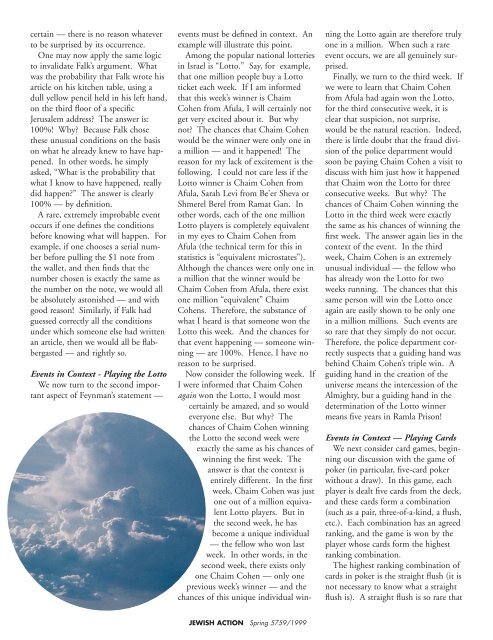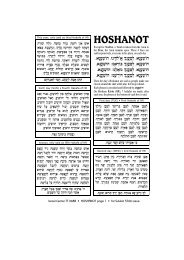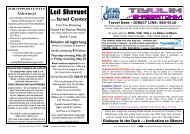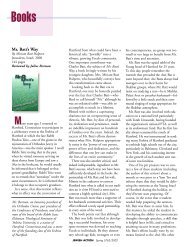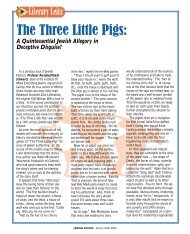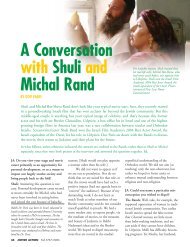The Anthropic Principle
The Anthropic Principle
The Anthropic Principle
You also want an ePaper? Increase the reach of your titles
YUMPU automatically turns print PDFs into web optimized ePapers that Google loves.
certain — there is no reason whatever<br />
to be surprised by its occurrence.<br />
One may now apply the same logic<br />
to invalidate Falk’s argument. What<br />
was the probability that Falk wrote his<br />
article on his kitchen table, using a<br />
dull yellow pencil held in his left hand,<br />
on the third floor of a specific<br />
Jerusalem address? <strong>The</strong> answer is:<br />
100%! Why? Because Falk chose<br />
these unusual conditions on the basis<br />
on what he already knew to have happened.<br />
In other words, he simply<br />
asked, “What is the probability that<br />
what I know to have happened, really<br />
did happen?” <strong>The</strong> answer is clearly<br />
100% — by definition.<br />
A rare, extremely improbable event<br />
occurs if one defines the conditions<br />
before knowing what will happen. For<br />
example, if one chooses a serial number<br />
before pulling the $1 note from<br />
the wallet, and then finds that the<br />
number chosen is exactly the same as<br />
the number on the note, we would all<br />
be absolutely astonished — and with<br />
good reason! Similarly, if Falk had<br />
guessed correctly all the conditions<br />
under which someone else had written<br />
an article, then we would all be flabbergasted<br />
— and rightly so.<br />
Events in Context - Playing the Lotto<br />
We now turn to the second important<br />
aspect of Feynman’s statement —<br />
events must be defined in context. An<br />
example will illustrate this point.<br />
Among the popular national lotteries<br />
in Israel is “Lotto.” Say, for example,<br />
that one million people buy a Lotto<br />
ticket each week. If I am informed<br />
that this week’s winner is Chaim<br />
Cohen from Afula, I will certainly not<br />
get very excited about it. But why<br />
not? <strong>The</strong> chances that Chaim Cohen<br />
would be the winner were only one in<br />
a million — and it happened! <strong>The</strong><br />
reason for my lack of excitement is the<br />
following. I could not care less if the<br />
Lotto winner is Chaim Cohen from<br />
Afula, Sarah Levi from Be’er Sheva or<br />
Shmerel Berel from Ramat Gan. In<br />
other words, each of the one million<br />
Lotto players is completely equivalent<br />
in my eyes to Chaim Cohen from<br />
Afula (the technical term for this in<br />
statistics is “equivalent microstates”).<br />
Although the chances were only one in<br />
a million that the winner would be<br />
Chaim Cohen from Afula, there exist<br />
one million “equivalent” Chaim<br />
Cohens. <strong>The</strong>refore, the substance of<br />
what I heard is that someone won the<br />
Lotto this week. And the chances for<br />
that event happening — someone winning<br />
— are 100%. Hence, I have no<br />
reason to be surprised.<br />
Now consider the following week. If<br />
I were informed that Chaim Cohen<br />
again won the Lotto, I would most<br />
certainly be amazed, and so would<br />
everyone else. But why? <strong>The</strong><br />
chances of Chaim Cohen winning<br />
the Lotto the second week were<br />
exactly the same as his chances of<br />
winning the first week. <strong>The</strong><br />
answer is that the context is<br />
entirely different. In the first<br />
week, Chaim Cohen was just<br />
one out of a million equivalent<br />
Lotto players. But in<br />
the second week, he has<br />
become a unique individual<br />
— the fellow who won last<br />
week. In other words, in the<br />
second week, there exists only<br />
one Chaim Cohen — only one<br />
previous week’s winner — and the<br />
chances of this unique individual winning<br />
the Lotto again are therefore truly<br />
one in a million. When such a rare<br />
event occurs, we are all genuinely surprised.<br />
Finally, we turn to the third week. If<br />
we were to learn that Chaim Cohen<br />
from Afula had again won the Lotto,<br />
for the third consecutive week, it is<br />
clear that suspicion, not surprise,<br />
would be the natural reaction. Indeed,<br />
there is little doubt that the fraud division<br />
of the police department would<br />
soon be paying Chaim Cohen a visit to<br />
discuss with him just how it happened<br />
that Chaim won the Lotto for three<br />
consecutive weeks. But why? <strong>The</strong><br />
chances of Chaim Cohen winning the<br />
Lotto in the third week were exactly<br />
the same as his chances of winning the<br />
first week. <strong>The</strong> answer again lies in the<br />
context of the event. In the third<br />
week, Chaim Cohen is an extremely<br />
unusual individual — the fellow who<br />
has already won the Lotto for two<br />
weeks running. <strong>The</strong> chances that this<br />
same person will win the Lotto once<br />
again are easily shown to be only one<br />
in a million millions. Such events are<br />
so rare that they simply do not occur.<br />
<strong>The</strong>refore, the police department correctly<br />
suspects that a guiding hand was<br />
behind Chaim Cohen’s triple win. A<br />
guiding hand in the creation of the<br />
universe means the intercession of the<br />
Almighty, but a guiding hand in the<br />
determination of the Lotto winner<br />
means five years in Ramla Prison!<br />
Events in Context — Playing Cards<br />
We next consider card games, beginning<br />
our discussion with the game of<br />
poker (in particular, five-card poker<br />
without a draw). In this game, each<br />
player is dealt five cards from the deck,<br />
and these cards form a combination<br />
(such as a pair, three-of-a-kind, a flush,<br />
etc.). Each combination has an agreed<br />
ranking, and the game is won by the<br />
player whose cards form the highest<br />
ranking combination.<br />
<strong>The</strong> highest ranking combination of<br />
cards in poker is the straight flush (it is<br />
not necessary to know what a straight<br />
flush is). A straight flush is so rare that<br />
JEWISH ACTION Spring 5759/1999


